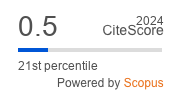Hygienic assessment of the effectiveness of training plan in high school
Abstract
Held the physiological-hygienic evaluation of the impact of effective educational plan for the functional status of senior high school students. The aim of the research was to study the effect of the mode in general education schools on 5-day training week on the functional State of the students 10-11 classes. Used modern physiologicalhygienic, clinical and statistical methods to assess mental health, emotional state, development of fatigue and neuroticism students 10-11 classes. Analysis of indicators characterizing the functional status of the body of pupils 10-and 11-grade in the dynamics of the school day and week, showed reduced functionality by the end of the course students and their restoration to the morning of the following day. In the dynamics of the school days were uncomfortable emotional States, reflecting the anxiety of schoolchildren, they often met 1.4 in adolescents 11 grades, compared to 10 grades. In the dynamics of the school week was granted the high fatigue, but increasingly these negative changes expressed in adolescents 11-th classes. 39% have 10-46 per cent of students and grade 10 11 grades identified adverse reactions in blood pressure in response to week-long academic load. More than half of the surveyed teens had increased and a high level of neuroticism, especially high values are observed in 11 classes. The learning process in terms of effective curriculum in senior high school accompanied by tension of the functional State of the body of adolescents.
About the Authors
V. R. KuchmaRussian Federation
Vladislav Remirovich Kuchma, head of the chair of hygiene of children and adolescents
5a Maly Kazenny lane, Moscow, 105064
Tel.: 8 (495) 917-48-31
M. I. Stepanova
Russian Federation
MD, prof. of the chair of hygiene of the Faculty of Pediatrics
Z. I. Sazanyuk
Russian Federation
PhD, leading researcher
I. P. Lashneva
Russian Federation
PhD, leading researcher
T. V. Shumkova
Russian Federation
PhD, leading researcher
A. Yu. Makarova
Russian Federation
PhD, associate prof. of the chair of hygiene of children and adolescents
References
1. Bezrukikh M.M. Health-keeping school. M. Moscow Psychological and Social Institute. 2004. 240 p.
2. Erofeev Yu.V., Mikheeva E.V., Novikova I.I., Polyakov A.Ya. The results of hygienic assessment of health of today's students // ZNiSO. 2012; 8: 10-12.
3. Kuchma V.P., Sukhareva L.M., Stepanova M.I. Hygienic problems of school innovations. M. SCCH RAMS. 2009. 240 p.
4. Chajkin S.V. The hygienic assessment of an alternative structure of the school year. PhD diss. abstract. M. 2002. 24 p.
5. Polenova M.A., Sazanyuk Z.I., Shumkova T.V. On the implementation of an integrated approach to optimizing learning in high educational load // ZNiSO. 2012; 11(236): 42-44.
6. Ulanova S.A., Shulga A.A., Bashkanova G.L. Teaching children in the active sensory-developing environment: a guide for primary school teachers and teachers of preschool educational institutions. Syktyvkar. 2001. 300 p.
7. Stepanova M.I., Sazanyuk Z.I., Polenova M.A. et al. Health-keeping possibilities of educational technologies // Gigiena i sanitariya. 2012; 2: 52-55.
8. Stepanova M.I., Sazanyuk Z.I., Polenova M.A. et al. Health-keeping possibilities of pupils in modern school // Rossij sky pediatrichesky zhurnal. 2011; 6: 37-40.
9. Aleksandrova I.E., Stepanova M.I., Sedova A.S. Regulation of the teaching load as a factor in preserving the health of schoolchildren // Rossij sky pediatrichesky zhurnal. 2009; 2: 11-14.
10. Setko N.P., Bulycheva E.V., Bejlina E.B. The functional state of younger students organism with different forms of organization of the school day // Voprosy shkolnoj i universitetskoj meditsiny i zdorovya. 2013; 1: 18-21.
11. Guidelines for the diagnosis and prevention of schoolrelated diseases, improvement of children in educational institutions / Ed. by V.R. Kuchma, P.I. Khramtsov. M. SCCH RAMS. 2012. 181 p.
12. Social determinants of well-being and adolescents. The study «The behavior of school-age children in health» / Ed. by C. Currie et al. Copenhagen. Regional Offi ce of WHO for Europe. 2012.
13. Sukhareva L.M., Namazova-Baranova L.S., Rapoport I.K. The morbidity of Moscow students in the dynamics of learning from the first to the ninth grade // Rossij sky pediatrichesky zhurnal. 2013; 4: 48-53.






































